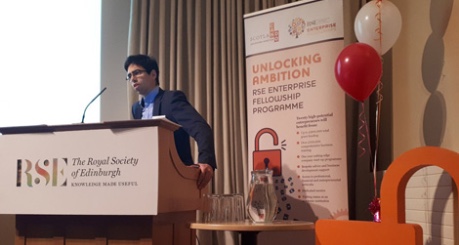Monday 8th July 2019, 9:15am
Squirming supersize dark brown maggots and cages crammed with tens of thousands of their winged big brothers and sisters are offering a tantalising glimpse into the future of farming.

It could result in maggots and insects being adapted to contain high levels of Omega 3 oils which, once turned into insect-based fishmeal could help boost the oil’s presence in farmed salmon, or insects deliberately bred with higher fat content to help meet nutritional needs of cattle and pigs or to be used as biofuels.
It’s also hoped the technology could also go on to play a key role in helping insect protein food companies scale up farm operations to mass produce bugs for human consumption.
According to Beta Bugs Director, Thomas Farrugia, the dawning of the age of the superbug is simply an evolution of the centuries of selective breeding of animals and plants to maximise agricultural yields.
"We are creating genetically better breeds of bugs, just as better breeds of chicken, pigs, cattle and fish have been produced."
"You can describe it as a ‘superfly’, but when you buy chicken in Waitrose, you could also call that a super chicken."
"The high-performance genetics element uses the same approaches as are used in livestock. These are not bugs that glow in the dark."
Thomas Farrugia, Director, Beta BugsUsing a mix of biotechniques and genetic breeding, the start-up develops high-performance strains of black soldier fly and selects traits such as protein content, growth rate, fat composition and temperature tolerance depending on clients’ needs.
The animal feed is then made from the highly-optimised fly maggots, helping to avoid environmentally damaging soy which has been blamed for deforestation and high carbon footprint.
The black soldier fly larvae are particularly effective, thanks to an apparently insatiable appetite and astonishing ability to turn almost any kind of organic waste – from agricultural leftovers to faeces – into high-quality protein, helping to solve two environmental issues at once.
While the fly larvae are currently on the agricultural menu, the start-up could also move into developing more efficient varieties of mealworms and crickets for human consumption, making the protein source more affordable.
In the case of mealworms, laboratory adaption could help provide an alternative to environmentally devastating palm oil production – mealworms have been found to have healthy fatty acid properties similar to palm oil, but with the potential for faster and more efficient production.
According to Farrugia, a key benefit of super insect-based animal feeds and fishmeal is that it has the potential to be produced in Scotland – avoiding the need to important soy-based feeds mainly from America.
Meanwhile, there could also be spin-off benefits for healthier farmed products.
"For example, more salmon are being farmed, and there’s a need for more fishmeal but the limit for fishmeal is capped so each fish gets less, which means it takes in less Omega 3."
"We now need to eat twice the amount of salmon now as we did 10 years ago to get the same Omega 3. So, we’re looking at ways of adding Omega 3 to the insect product."
Thomas Farrugia, Director, Beta BugsThe start-up, based at the University of Edinburgh's Roslin Innovation Centre, is one of 40 businesses which was last year selected as part of the Scottish Government’s £4m challenge fund, Unlocking Ambition.
Half were established businesses which have spent the past year being guided by mentors linked to Scottish Enterprise, while the remaining 20 young start-ups, including Beta Bugs, were introduced to the Royal Society of Edinburgh’s Unlocking Ambition Enterprise Fellowship programme.
Among them is a revolutionary robotic lawnmower business, which has introduced ground-breaking mapping technology to enable machines to work across large areas of land, such as golf courses and parks.
Joan Kangro, the founder of Kingdom Technologies Ltd., says the robotic lawnmowers have been designed with multiple sensors and cameras to enable them to operate safely in public spaces.
"Other robot lawnmowers use reactive safety measures, so if they bump into an obstruction they will go in a new direction. But studies have shown that’s not safe around children and pets."
"Our robot sees when someone comes into close proximity and stops before it hits the object."
The large terrain robotic lawnmowers are also designed to cut the lawn’s edges and close to obstacles – removing the need to trim edges of flower beds – and to operate using mapping technology, removing the need for boundary cables.
Other businesses included in the RSE Fellowship include CogniCare, which uses machine learning to offer personalised support to people affected by dementia, Fodilicious which provides premium, ‘free-from’ convenience foods including low FODMAP, gluten-free and vegan, and ALICAS which gifts bespoke clothing parcels to women in clothing crisis.
"Scotland has a global reputation for innovation, and we need to maintain that entrepreneurial spirit. It’s vital that we have a sustainable approach to supporting start-ups that create high-quality jobs, boost the Scottish economy and change lives through new ideas."
"The RSE’s Unlocking Ambition Enterprise Fellowship was designed with those goals in mind and participants have grasped the opportunity, with some fantastic results after just 12 months. Time, money, and expert advice and guidance are key to turning a bright idea into a viable business with long-term potential and our programme has offered all of these to early-stage businesses with masses of potential."
"These companies are the employers of tomorrow, innovating for the future, and we have helped them to take huge strides forward in their growth journey towards being Scotland’s business success stories."
Professor Dame Anne Glover, RSE PresidentNews article published in The Herald